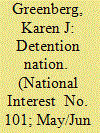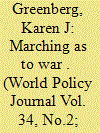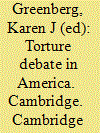|
|
|
Sort Order |
|
|
|
Items / Page
|
|
|
|
|
|
|
| Srl | Item |
| 1 |
ID:
087946


|
|
|
|
|
| Publication |
2009.
|
| Summary/Abstract |
IN FEBRUARY, four weeks into office, the Obama administration released its first prisoner in the war on terror-Binyam Mohamed. An Ethiopian citizen, Mohamed had been granted asylum status in Britain, a status which lapsed in 2004, around the time he arrived at Guantánamo Bay. Mohamed claims to have been picked up in Pakistan in April 2002, flown to Morocco where he was tortured-beaten, his penis and chest cut with a scalpel, his body burnt-and then sent on to Guantánamo, all apparently under American auspices. In this first release, there were some curious parallels with the Bush administration's version of emptying Guantánamo. Obama's team saw the transfer of Mohamed to UK custody, like the Bush White House saw the transfer and release of over 550 detainees, as a matter ultimately of diplomacy, not of legal process, one that relied upon political alliances. Moreover, the release took place outside of the military-commission proceedings. Although Mohamed was represented by Clive Stafford Smith, one of the most well-known of the detainee defense attorneys, his release, it seems, was essentially the decision of the president, not of any trial or review process. As the original commander at Guantánamo has said about the release of detainees under the Bush administration, it took a petty officer to put a detainee on a plane to Guantánamo and a presidential order to get him out.
|
|
|
|
|
|
|
|
|
|
|
|
|
|
|
|
| 2 |
ID:
155532


|
|
|
|
|
| Summary/Abstract |
President Donald Trump’s Hobbesian worldview is pushing U.S. national security policies to harsher, meaner places, according to Fordham University’s Karen J. Greenberg.
|
|
|
|
|
|
|
|
|
|
|
|
|
|
|
|
| 3 |
ID:
072411


|
|
|
|
|
| Publication |
Cambridge, Cambridge University Press, 2006.
|
| Description |
xvii, 414p.
|
| Standard Number |
0521674611
|
|
|
|
|
|
|
|
|
|
|
|
Copies: C:1/I:0,R:0,Q:0
Circulation
| Accession# | Call# | Current Location | Status | Policy | Location |
| 051350 | 323.49/GRE 051350 | Main | On Shelf | General | |
|
|
|
|
| 4 |
ID:
090167


|
|
|
|
|
| Publication |
2009.
|
| Summary/Abstract |
On 16 April 2009, US President Barack Obama, responding to an American Civil Liberties Union (ACLU) Freedom of Information Act request, released four Bush-era documents belonging to a series of papers known collectively as the 'torture memos', which outline the US government's legal analysis and policy decisions for interrogating terrorism suspects in the wake of the 11 September 2001 attacks. In the years since the release of the Abu Ghraib photographs and the subsequent reports into detention and interrogation policies in the 'war on terror', the public has been made generally aware of the content of these papers. Beginning in summer 2004, we have been able to read many of the major documents, including the infamous memo of 1 August 2002 that redefines torture; the Alberto Gonzales memo of 25 January 2002 that called the Geneva Conventions 'quaint and obsolete'; and Donald Rumsfeld's letter signing off on the enhanced interrogation techniques that would create a law-free zone at Guantanamo Bayfor six weeks from early December 2002 until January 2003. All of these have been subjected time and again to the scrutiny of scholars and experts such as Philippe Sands, Mark Danner and others, as well as to the attention of congressional oversight committees.
|
|
|
|
|
|
|
|
|
|
|
|
|
|
|
|
|
|
|
|
|